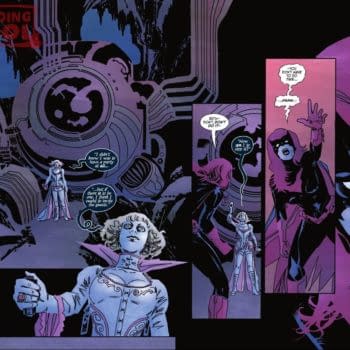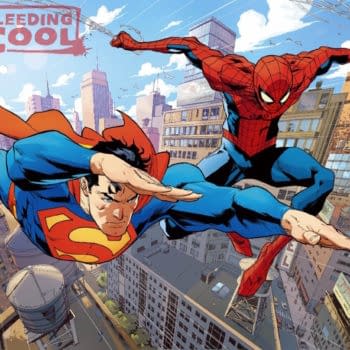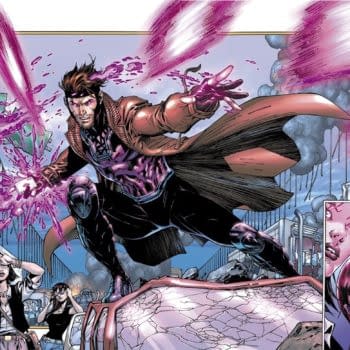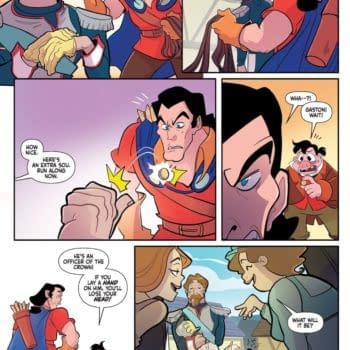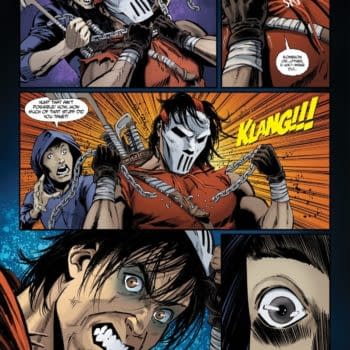Posted in: Comics, Recent Updates | Tagged: Batman, Comics
Travis Langley's Batman And Psychology: Diagnosis Dull

In light of the tragic shooting in Aurora, Colorado, it seems ridiculous and irresponsible to carry on with this review without at least mentioning it. But drawing any conclusions between real-life events and the comic book world would only add fuel to the arguments that life imitates art, that fictional depictions of violence will cause things like mass murder. Obviously, that is not the case, but if the mainstream media wants to show how violent comic books can be, then we as comic fans should show how inspiring they can be as well. If one half-page scene in a 25 year old comic will drive someone to murder, then we should show the world what the legacy of Batman, and the good he represents, can do as well. Bruce Wayne would donate money, or build a new hospital in the light of such a tragedy, so we in turn should donate to the Red Cross, or a victims of violence charity. If you don't have money to spare, donate your time to something like a troubled youth program, or even your blood to a hospital in need. Superheroes are here to inspire and show our potential as humans, and hopefully we can rise above the horrific events of today to live up to that potential.
The trend of intellectualizing comic books is really starting to suck all the fun and wonderment out of my favorite pop-cultural reading material.
This really started with Robert Weinberg's The Science of Superheroes, which used real scientific methods to debunk and explain various superhero powers and technologies, and has since moved on to include such illustrious tomes as The Physics of Superheroes, Superheroes and Philosophy, Superman On the Couch, and countless others. Added to that list Travis Langley's Batman and Psychology: A Dark and Stormy Knight, a pop-intellectual take on the Gotham Universe that uses the "latest in psychological research" to make some sense of everyone's favorite Caped Crusader.
Langley breaks down his books into chapters covering all things Batman, from his violent origins, to his choice of costumes, to his insistence on young male sidekicks. Every single aspect of Batman is analyzed within a psychological framework, so the book acts as a sort of psychiatry primer, but herein lies the problem:
Using Abraham Maslow's Hierarchy of Needs to explain the emergence of criminal behavior and Batman's lack of self-actualization is one thing, but slogging through pages of dense, technical psychological jargon is something that most comic fans will not want to do.
The other issue is that after pages and pages of boring psycho-examination, Langley's outcomes seem rather obvious and self-evident, and even humorous in their seriousness. Take his analysis of the psychotic villain Black Mask for instance:
"When he [Black Mask] tortures Catwoman's sister Maggie and brother-in-law, kills the brother-in-law, and forces Maggie to eat her husband's eyes, this is an expressive act driven by intrinsic motivation, an expression of his own feelings, something he enjoys."
Langley then goes on to diagnose the Black Mask with sadistic personality disorder. Well, yeah, he's the freakin' Black Mask, and he likes to torture people, any 10 year-old Batman fan could tell you that.
One thing that does spice up the excessively analytical passages is the inclusion of "Case Files", which give brief psychological overviews of Batman's Rogues Gallery. But again, these too seem overly blatant and apparent. During the course of this book, we learn that (spoiler alert):
- The Riddler has obsessive compulsive disorder (OCD), with features of narcissistic personality disorder.
- The Penguin suffers from what's "informally known" as a Napoleon complex.
- The Mad Hatter, already dealing with an inferiority complex and a diagnosis of paranoid schizophrenia, also has a deep fetishism for inanimate objects, namely (you guessed it) hats.
The fog lifts a little in later chapters, as Langley has fun analyzing Batman with Freudian principles of the psychosexual stages of development, and dives right into the slightly more familiar psychological territory of Oedipal complexes, the pleasure principle, and penis envy. He also makes hay with everyone's favorite buzzkill Frederic Wertham, rehashing all those snicker-inducing hypotheses about the "true nature" of Batman and Robin's relationship. And in my favorite part, Langley draws some accurate and perceptive parallels between Batman and Hamlet, showing us that a Hero's journey has changed very little across the last 400 years or so.
Throughout this book, Langley does come up with the occasional ray of insight; though, ultimately, the problem with Batman and Psychology is that it's far too dry and technical for the average comics fan. Further, it is probably not technical enough for the average psychology student.
As a result, it fails to entertain OR enlighten.
By day, Matt Streets is the mild-mannered manager of Chicago's busiest comic book store, Graham Crackers Comics. By night, he is a font of categorized information about comics, movies and music. You can check out more of Matt's writing on Keeping It Reel, where, as the "Criterion Completist", he has undertaken the weighty task of watching every single movie in the Criterion Collection. (He figures he'll finish in about 27 years.)








